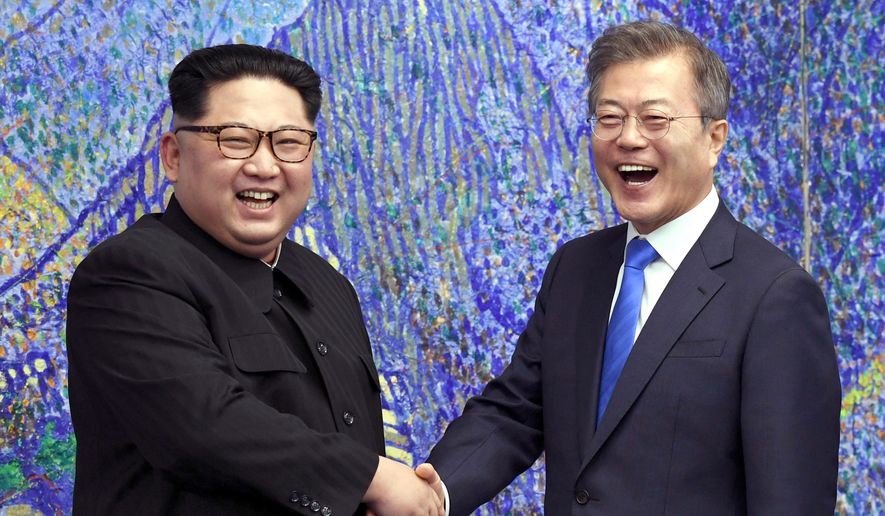OPINION:
On April 27, 2018, South Korea’s President Moon Jae-in and North Korea’s Chairman Kim Jong-un signed a historic document, the Panmunjom Declaration. This document committed the North and the South to end the Korean War and begin an era of peace, prosperity and reconciliation and a nuclear-free Korean Peninsula.
As we approach the second anniversary of the document’s signing, the United States and others should encourage Mr. Moon and the leader in the North to re-engage and discuss the actual implementation of the Panmunjom Declaration.
The historic landslide victory of South Korea’s ruling party provides Mr. Moon with a public mandate to use the remaining two years of his tenure to secure momentum on a peace treaty to formally end the Korean War and initiatives on economic and humanitarian cooperation with the North. South Korea’s swift and impressive management of the COVID-19 pandemic, with advanced testing capabilities and other preventive measures, could be made available to North Korea, despite its claim that there are no COVID-19 cases in the North.
A dialogue with the North on humanitarian issues like programs that reunite separated families from the Korean War could and should be pursued, especially now, when a pandemic is threatening the lives of so many elderly people.
Many in South Korea want to resume visits to the North’s Mount Kumgang, suspended in 2008 when a South Korean tourist was shot dead by a North Korean soldier after straying into an off-limit area. The South had also argued for the reopening of the Kaesong Industrial Complex, a 2004 joint economic initiative with the North that comprised more than 120 South Korean companies that employed North Korean workers. It was closed in 2016 after the North conducted its fourth nuclear test.
These and other intra-Korean economic and humanitarian initiatives should again be discussed with the United States and the United Nations Sanctions Committee, seeking their support for the South to move forward with these and other initiative, in the context of implementing the Panmunjom Declaration.
During March 2020, North Korea launched nine short-range ballistic missiles. On April 14, the North launched a number of cruise missiles, on the eve of parliamentary elections in South Korea. Since the failure of the Hanoi Summit between President Donald Trump and Chairman Kim Jung-un in February 2019, there has been no meaningful dialogue with the North.
However, as we approach the second anniversary of the June 12, 2018, Singapore Summit Joint Statement between Mr. Trump and Mr. Kim, there may be an opportunity for the lead working-level negotiators of both countries to meet and attempt to restart U.S.-North Korea talks, with a focus on implementing a Joint Statement that committed the United States and North Korea to eventual normal relations, a peace treaty ending the Korean War and complete denuclearization of the Korean Peninsula.
At a time when the COVID-19 pandemic has ravaged so many countries, killing and hospitalizing so many people, and while we mitigate this onslaught and pursue a vaccine to defeat this virus that knows no borders or boundaries, one would hope that as a people we can come together to defeat this and other potential pandemics, while, also, resolving geopolitical issues that separate us.
The nuclear issue with North Korea is one of those issues. It is one of the most important national security issues that has eluded resolution since the end of World War II. Twenty-six years of direct negotiations with the North, since 1994, have failed, miserably. The North now has more nuclear weapons and sophisticated missile delivery systems than previously. Kim Jong-un is a young leader who took over from his father, Kim Jong-il, in December 2011, saying his focus was on economic development, while pursuing nuclear weapons as a so-called deterrent.
In 2018 and 2019, Mr. Kim had a series of summits and meetings with Presidents Moon, Trump, Xi and Vladimir Putin. Each of these sessions was proclaimed a success. Two of these meetings, separately with Mr. Moon and Mr. Trump, resulted in a memorialized document: The Panmunjom Declaration and the Singapore Summit Joint Statement. Thus, it would be unfortunate if neither of these documents is pursued, with the goal of implementation. Indeed, both should be pursued, especially now, when cooperation and transparency are important, in a time of so much uncertainty for all people.
Mr. Moon should be encouraged to pursue a dialogue with the North. A dialogue that would ease tension between the Koreas and hopefully produce a number of economic and humanitarian initiatives that would bring the two Koreas closer together, on a path to eventual unification.
Hopefully, North Korea would respond positively to U.S. overtures to resume negotiation for the purpose of implementing the Singapore Summit’s Joint Statement.
Both of these attempts to engage the North can and should be pursued simultaneously, given that the goal is peace and reconciliation on a denuclearized Korean Peninsula.
• Joseph R. DeTrani was the former Special Envoy for Negotiations with North Korea. He is currently a Fellow at the Institute of Corean-American Studies. The views are the author’s and not any government agency or department.




Please read our comment policy before commenting.